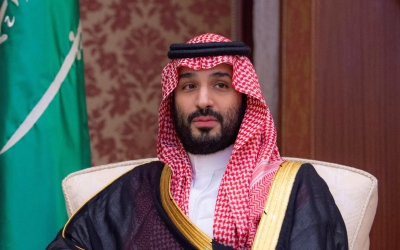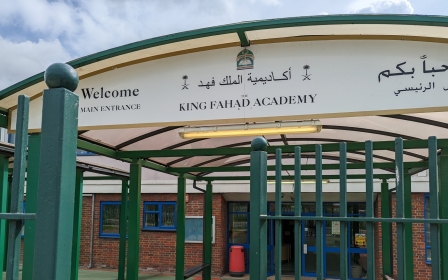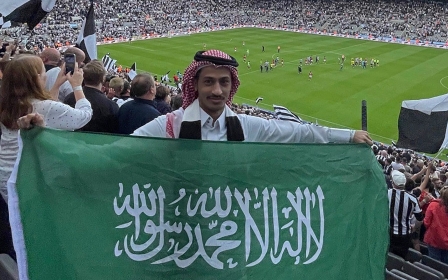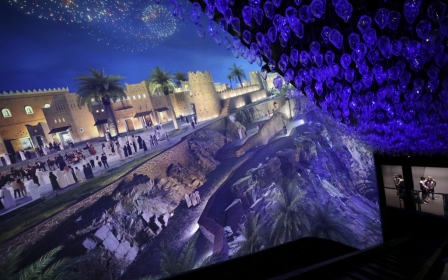The rise and fall of London’s King Fahad Academy
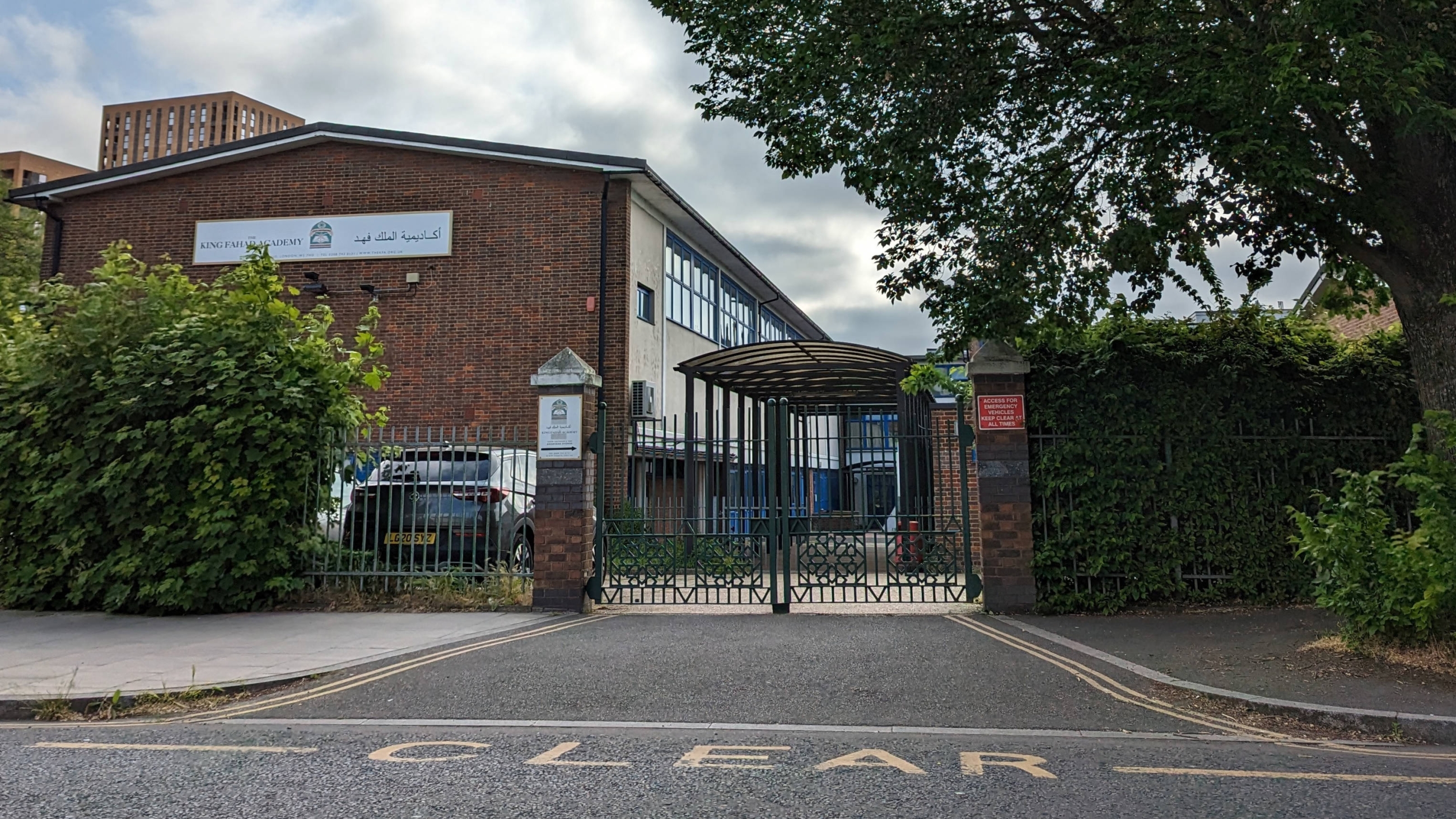
Mona Taha Mahmoud remembers saying goodbye to her father at the gates of her new school on her first day.
It was 1985, and beyond the “fortress-like green iron gates” to a young Mahmoud’s five-year-old eyes, was the newly-opened, King Fahad Academy (KFA) in London.
Now in her 40s and speaking from her home in Nottingham, the former banker says her Egyptian father and English mother were part of a growing Arab and North African community which were quietly laying foundations across parts of London.
Her father worked for the Saudi-owned Arab Press House in Holborn, where newspapers like Asharq al-Awsat started printing in the late 70s. Academics, artists, doctors and the oil nouveau-riche were seeking to establish themselves in the UK - in search of better opportunities or escaping political uncertainties in their own countries.
They would all need schools for their children, and the newly-opened KFA offered what they were looking for.
New MEE newsletter: Jerusalem Dispatch
Sign up to get the latest insights and analysis on Israel-Palestine, alongside Turkey Unpacked and other MEE newsletters
“There weren’t many choices back then,” Mahmoud tells Middle East Eye. “There was Islamia, run by Yusuf Islam, but at the time it was a little more conservative.
“Our parents were looking for a safe environment - where we could marry Arab social values with a good British education, all within a moderate Islamic setting. The school at the time offered the best of both worlds.”
A school for all Arabs
King Fahad opened the educational institution at a time when Saudi-UK relations were warming once again after the 1970s oil embargo.
The monarch was often described as a visionary, transforming Saudi Arabia into a modernised nation state - although this proved a delicate balancing act in keeping the ruling clergy happy.
Fahad, who served as education minister in the kingdom from 1953-1962, would also open the Islamic Saudi Academy of Washington (1984) in Virginia; The Malek Fahd Islamic School in Sydney, Australia (1989); and another King Fahad Academy in Bonn, Germany (1995) - his way of leaving a legacy and opening doors for Saudi soft power.
Children of Arab elite would study alongside students who lived in west London council estates. Exiled political leaders, diplomats, Syrian businessmen, Iraqi doctors, the leaders of the Muslim Brotherhood and the Mujahideen all chose the school, located in a residential area in East Acton, for their children’s education.
"My father got a job as an Arabic teacher at the school when it opened. He arrived in the UK from Aleppo, Syria, in 1980, where I was also born," recalls Aischeh al-Zeer, another former student.
“We really didn’t care, or pay attention to who our friends' parents were. At school we were just kids dealing with the same challenges children face, the benefit was we didn’t have to explain our faith. It allowed us to feel confident in our identity as Muslims and as British kids.”
But the geopolitics of the world around them would inevitably play out on the playground.
In 1990, Saddam Hussein of Iraq invaded Kuwait. King Fahad, fearing Saddam may set his sights on Saudi Arabia, allowed US forces to set up a base in the kingdom and station 500,000 US troops .
The UK was an ally to Kuwait. That same year, scores of Kuwaiti children flooded through the academy doors. By this point, the then segregated school had already acquired another building in Ealing, it's here the girls secondary students were taught.
“I remember there were badges that the Kuwaiti kids must have had made which said ‘Free Kuwait’, but some of the Iraqi kids would tippex over the ‘Free’ and instead write over it with a marker pen to read, ‘What’... changing it to ‘What Kuwait?’ It was just seen as playground banter,” remembers Palwasha Amanyer, another pupil who joined when the school first opened.
“They [Kuwaiti students] were given preferential treatment, like getting to go for lunch first."
Her father, Mohammad Ashraf Amanyar, a surgeon, was the president of the Afghan Mujahideen in Europe.
“When the school first opened, they’d merge some of the classes between year groups as class sizes were so small. I was put in the same class as my sister who was four years older. Everyone knew each other and it felt like family,” says Amanyer, now working as an ESOL teacher.
'Badly managed'
The school’s closure after 38-years has come as a shock to the teachers working there, and to the almost 500 students enrolled.
In May, the Board of Trustees, headed by the Saudi Ambassador Prince Khalid bin Bandar bin Sultan bin Abdulaziz Al Saud, issued a letter to parents confirming the closing of the school with “very much regret”.
It said the funding of the school had been reconsidered by Saudi Arabia following a change to its education policy, “funding will no longer be provided from the end of the current academic year”.
The announcement had left both parents and students in a tailspin, desperately trying to secure new schools for the following academic year.
“It was badly managed”, says a parent with two children at KFA.
They can 'afford the upkeep of footballers but can’t fund our school'
- Parent of KFA student
The parent did not wish to be named, concerned about repercussions from Saudi authorities, like being blocked from travelling for Hajj or Umrah.
“If they had given us more notice, as this must have been in the pipeline for a while, we could have better planned in finding school places for our children in September,” they said.
Petitions and MP pleas in parliament were not enough, the decision had already been made, leaving many to wonder how a country with Saudi Arabia’s levels of wealth could have funding issues.
Social media sites mocked the country’s ability to invest in football players like Ronaldo, but not keep up its educational obligations.
“While it was happening, Messi was in Saudi Arabia and there were tweets saying they can afford the upkeep of footballers, but can’t fund our school," said the parent.
The latest school accounts on Companies House for 2021 show an investment of £6,437,909 ($8,427,544) from the Saudi government, with an additional £456,624 ($597,743) in tuition fees from non-Saudi children attending the school. Education is free for the Saudi students. The school had a year end surplus of £119,298 ($156,168).
The report also said the trustees were “confident the academy has adequate resources to be able to operate its current undertakings for the foreseeable future.”
“Something must have happened behind closed doors, but all we can do is speculate,” another parent added.
The best of both worlds
As news filtered through, the emotions of school alumni were mixed. Some said it was about time, while others still pined for their old school days. One thing they all agreed upon was that the microcosm created by the school had built a familial-network and enduring friendships.
“The thing is with fellow KFAers, no matter where you go, when you meet one, you just connect," Mahmoud says.
After university. many moved back to the lands their parents had left behind, teaching at English schools in Egypt, becoming investment bankers in Dubai, or engineers in Qatar. The unique cross-cultural school experience had served them well.
At the school’s inception, Arabic and Islamic Studies were taught comfortably alongside a British curriculum. Students would relive Premier League highlights in break time football matches and perform daily prayers at the school’s purpose-built mosque after lunch.
“We were all Muslim but weren’t a homogenous group. I remember at prayer time in the girls' school there’d be some that would always pray, and then there’d be the girls who’d skip prayers citing ‘women’s issues’ for the entire year, instead of once a month,” laughs Marwa el-Borhamy, who studied at the school in the 90s, returning to teach there herself years later.
“But there was also never any judgement, that was the beauty of it.”
The devout would organise spring breaks to go and perform Umrah when they were old enough to holiday together, while others in some year groups would host alcohol-free parties in rented basement halls of four-star Kensington hotels.
It would be here that some of the boys and girls - studying by day in a segregated school - would end up meeting to dance to the latest mix of RnB tunes.
No winning formula
KFA's former head, Ibtisam al-Bassam, and the late ambassador, Ghazi al-Gosaibi, worked together for a decade, 1992–2002, to focus on educational excellence.
"The school was invested in back then, and because of Saudi-UK diplomatic relations, we'd have special guests like Margaret Thatcher [or] John Major presenting us awards at special events," Borhamy says.
But as the school's leadership changed, so too did its direction.
“They changed the curriculum, taking on a Saudi one, and so excluding a wider pupil base. It was the beginning of the end,” Borhamy adds.
The academy 'allowed us to feel confident in our identity as Muslims and as British kids'
- Aischeh al-Zeer, former student
“It’s changed its curriculum so many times, as it has its heads. It went to an International Baccalaureate system and then just recently back to standard GCSEs and A-Levels - it lacked consistency, that was its shortcoming.”
It was also during that time, in 2007, that the school was accused of using Saudi textbooks to teach hate, a claim both teachers and students deny.
Sumaya al-Yusuf, the head of the school at the time, insisted students weren't ever taught religious hatred or intolerance.
A decade later, the school would fail an Ofsted inspection (Office for Standards in Education) - it needed improvements on all fronts.
Around the same time, its sister school in Bonn, Germany, was closed down after being accused of breeding extremist ideology.
“Yes the school hadn’t been doing well for a time, but the irony is that it made changes and in a new inspection by the Independent Schools Inspectorate, it showed it had made improvements and was doing well,” Borhamy says.
In 2020, KFA became co-ed for the first time in its history. It was a huge change, both culturally and symbolically, and there were waiting lists to join the school.
But it wasn’t enough, the decision had already been made.
“No one was able to find the winning formula again - the school that once shone in the 80s and 90s became an enigma," says Borhamy.
Saudi educational reforms
Saudi education has traditionally focused on the study of the Arabic language and the Quran and Sharia law, known as the kuttab system.
It wasn't until 1925 that the kingdom introduced a more structured form of education, based on rote learning, according a paper published in 2020 by Taiseer Mirghani, an academic from the University of Derby.
Mirghani argued that for the Saudi education system to reform, it must move away from rote learning and allow for critical thinking.
With the launch of Crown Prince Mohammed bin Salman's Vision 2030 - an economic and social strategy to diversify the economy away from oil - the kingdom has made educational reforms one of its top priority.
As part of the $22bn strategic education reform initiative, textbooks are being revised, teachers are being trained and critical thinking is said to also be encouraged.
It’s a wonder that better investment and educational reforms weren’t considered for the school
- Mona Taha Mahmoud, former student
Under Crown Prince Mohammed bin Salman’s The Custodian of The Two Holy Mosques scholarship programme, launched last year, thousands more Saudi Arabian students are offered scholarships, including tuition paid and a monthly stipend, at leading universities around the world.
The letter from the KFA's board of trustees alluded to educational reforms in line with Saudi Arabia's Vision 2030 being the reason behind the closure of "certain establishments".
The US is the top choice for Saudi Arabian students who have been pursuing higher education there since the 1950s, with the UK a close second favourite. Figures for 2020-2021 show that 8,750 higher education students in the UK were Saudi Arabian, though it’s unclear how many of these were on government scholarships.
While studying in London to better contribute to their country, it’s these same students that had enrolled their children at KFA.
As it closed its green iron gates for the last time in early July, Mahmoud reflects: "It’s a wonder that better investment and educational reforms weren’t considered for the school - potentially returning it to the beacon of educational and Islamic values that it had once stood for."
Middle East Eye delivers independent and unrivalled coverage and analysis of the Middle East, North Africa and beyond. To learn more about republishing this content and the associated fees, please fill out this form. More about MEE can be found here.


